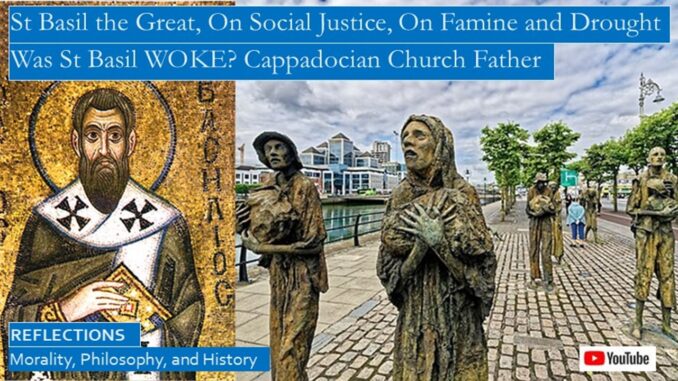
Does God afflict us with drought and famine to punish us for our sinfulness?
Did the city-states of Greece and the provinces of Rome feed the starving poor?
Why were farmers in the ancient world so terrified of drought and famine?
Should Christians give alms to the deserving poor, and to the undeserving poor?
Should the poor give alms to help those who are poorer?
Why does our all-powerful and Loving God permit famine, hunger, and starvation?
In our first reflection of St Basil’s collection of homilies “On Social Justice,” he reflects on the story of the Rich Young Man who asks Jesus what he must do to be perfect. When told that if he wants to do more than fulfill the commandments, he must sell all that he owns and give it to the poor, he balks, because he cannot part with his possessions.
Was St Basil Woke? Basil the Great On Social Justice, Homily To the Rich Man
https://seekingvirtueandwisdom.com/st-basil-the-great-on-social-justice/
https://youtu.be/PT_I5IrZGzY
Then St Basil reflects on the Parable of the Rich Fool, who decided to build bigger barns, not knowing that God would soon call for his soul.
Was St Basil WOKE? St Basil the Great On Social Justice, Parable of the Rich Fool
https://seekingvirtueandwisdom.com/was-st-basil-woke-st-basil-the-great-on-social-justice-parable-of-the-rich-fool/
YouTube video for this reflection: https://youtu.be/c8YXs7y4RrU
IN TIME OF FAMINE AND DROUGHT
Caesarea experienced a severe drought and famine for several years soon after St Basil was ordained as a priest, which influenced his many homilies on Social Justice. St Basil echoes the prophet Amos when he suggests that the suffering experienced by the Christians of his day was punishment for their neglect of the poor and powerless.
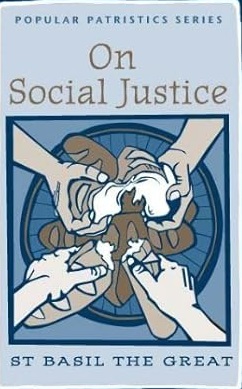
St Basil teaches us in his homily, “In Time of Famine and Drought,” that in the time of Amos “the people abandoned the piety of their forebears and disregarded the careful observance of the Law, slipping gradually into the service of the idols. Amos became a preacher of repentance, urging the people to turn back and warning them of the coming punishment.”
St Basil continues: “The people were rebellious: they were like a stiff-necked and stubborn colt that has caught the bit in its teeth and so cannot be properly guided, but rather turns aside from the right path, prancing wildly, rearing and snorting as it struggles against the one who holds the reins, so that in the end it falls off a cliff into a ravine, suffering deserved ruin for its disobedience.”
In our modern world, we are less likely to blame severe weather on our sinfulness, instead blaming climate change and evolving atmospheric conditions. Though we are far more likely to view the weather as somewhat random, yet we can never prove that God does not intervene in the world, or at least place His divine finger on the scales to influence events.
EFFECTS OF DROUGHT AND FAMINE IN THE ANCIENT WORLD
What was the government’s role in helping the poor when disasters struck? Overall, the government in ancient Greece and Rome assisted the residents of the cities, Rome and Athens in particular, but evidently those living on farms in the country were on their own. We know that during the Peloponnesian Wars, the Athenian city-state fed the populace from grain purchased and shipped from independent Greek colonies on the shores of the Black Sea. We know far less about Thebes and Corinth than we do Athens. We know that Alexander the Great destroyed Thebes and Corinth, perhaps he also destroyed much of the literature and records of these cities.
Ordinary Life and Justice in Ancient Athens, Rome, and Israel
http://www.seekingvirtueandwisdom.com/ordinary-life-and-justice-in-the-ancient-world/
https://youtu.be/vl8KGL5Yx2w
Thucydides and Plutarch: Pericles and the Beginning of the Peloponnesian War Between Athens and Sparta
http://www.seekingvirtueandwisdom.com/thucydides-and-plutarch-pericles-and-the-beginning-of-the-peloponnesian-war-between-athens-and-sparta/
https://youtu.be/1ra58mg33nM
Slaves in the Ancient World, Blog 1, Were Slaves the Employees of the Ancient World?
http://www.seekingvirtueandwisdom.com/slaves-in-the-ancient-world-blog-1-were-slaves-the-employees-of-the-ancient-world/
Slaves in Ancient Greece and Rome, Blog 2
http://www.seekingvirtueandwisdom.com/slaves-in-ancient-greece-and-rome-blog-2/
https://youtu.be/O67cmVRvBtA
Draco, Solon, and Cleisthenes, Democracy and Justice in Ancient Greece
http://www.seekingvirtueandwisdom.com/draco-solon-and-cleisthenes-democracy-and-justice-in-ancient-greece/
https://youtu.be/6sNSaOoQoJs
Likewise, the poor living in Rome were provided a grain ration by the government to prevent popular uprisings. We also know that the Stoic Emperor Marcus Aurelius helped the poor when the plague struck Rome. But the ancient records of the state of the provinces, and the minor Greek City-States, are scanty at best, and St Basil does not mention the government at all, suggesting it played no role in alleviating the famine. The Roman provinces were on their own. We know so little about living conditions in the ancient world, as the ancients just did not think to preserve the statistics that modern sociologists accumulate. We only have guestimates and glimpses on what life was like for the ordinary citizens of the ancient world.
Ordinary Life for Romans Under Stoic Emperor Marcus Aurelius
https://seekingvirtueandwisdom.com/ordinary-life-for-romans-under-stoic-emperor-marcus-aurelius/
https://youtu.be/9hgSbcgbCJw
Biography of Marcus Aurelius, Stoic Philosopher and Roman Emperor
https://seekingvirtueandwisdom.com/biography-of-marcus-aurelius-roman-emperor-and-stoic-philosopher/
https://youtu.be/nvWYu8ofhCA
Ancient Warrior Societies, Blog 1, The Warrior Ethos of Ancient Greece, Rome, and Israel
https://seekingvirtueandwisdom.com/ancient-warrior-societies-blog-1-the-warrior-ethos-of-ancient-greece/
Ancient Warrior Culture, Concubines, and Slaves, Ancient Greece, Rome, and Israel
https://youtu.be/7QAZ_s6zw4E
Ancient Warrior Societies, Blog 2, Greek and Roman Armies and Navies
https://seekingvirtueandwisdom.com/ancient-warrior-societies-blog-2-greek-and-roman-armies-and-navies/
Ancient Warrior Societies, Blog 3, World of the Old Testament
https://seekingvirtueandwisdom.com/ancient-warrior-societies-blog-3-world-of-the-old-testament/
Ancient Warfare in Ancient Greece, Rome, and Israel. Did Joshua Massacre Pagans in Promised Land?
https://youtu.be/9xKxqAbJ2qY
St Basil describes what the drought was like. “I saw the fields and wept bitterly for their unfruitfulness. I poured out my lament, since the rain does not pour down upon us. Some of the seeds dried up without germinating, buried by the plow beneath clumps of dried earth. The rest, after just beginning to take root and sprout, were withered by the hot wind in a manner pitiful to see.”
St Basil describes the misery caused by the famine. “Farmers sit in their fields and clasp their hands against their knees, mourning, weeping for their wasted efforts. They look at their young children and burst into tears, they see their wives and wail with grief, as they stroke and caress the dried-up crops, racked with sobs like parents who lose their children in the flower of youth.”
St Basil describes how the farmer is helpless when facing bad weather. “See how the multitude of our sins has” “changed the character of the seasons, producing these unusual temperatures. The winter did not produce alternating wetness and dryness as usual, but rather kept all its moisture frozen into ice, and so passed with no sign of snow or rain. The spring showed only one side of its nature, namely warmth, but without any wetness. Scorching heat and biting frost” “conspired to wreak severe damage upon human beings, even depriving them of life itself.”
In his homily “Against Those Who Lend at Interest,” St Basil reveals why a crop failure would terrify many a small farmer. “I have beheld a terrible spectacle: children of free birth being dragged to the auction block on account of the debts of their parents. Do you have no money to leave behind for our children? Do not take away their free birth as well! Preserve but one thing for them: their freedom, the same inheritance you received from your own parents.” “Do not leave behind a ledger that will” be “a parental curse upon your children and grandchildren.”
Whereas families were broken up in the ancient world when parents were compelled to sell their children into slavery to settle their debts, in the American Deep South slave families were broken up when their masters sold the children for profit. Quite often, younger, more valuable slaves were sold by slave masters in Virginia and other mid-Atlantic states to the more fertile Black Belt states in Georgia, Alabama, and Mississippi. Frederick Douglass witnessed this, and several of our slave narratives involve slaves who ran away to freedom to prevent the breakup of their families.
Frederick Douglass Tells Us About His Life as a Slave in his Autobiography
http://www.seekingvirtueandwisdom.com/frederick-douglass-tells-us-about-his-life-as-a-slave-in-his-autobiography/
https://youtu.be/7VkzhyNnuQk
Underground Railroad: Eliza and Her Infant Escape Slavery Over the Ice Before the Civil War
https://seekingvirtueandwisdom.com/eliza-harris-and-her-infant-escapes-slavery-over-the-ice/
https://youtu.be/kRSzNZP73og
Margaret Fleeing to Freedom With Help From Watch, Her Mastiff, and Epictetus on True Freedom
https://seekingvirtueandwisdom.com/margaret-fleeing-to-freedom-with-help-from-watch-her-mastiff-and-epictetus-on-true-freedom/
https://youtu.be/dw127D8b1gk
Margaret Garner, Slave Mother Who Killed Her Child to Avoid Slavery, Inspiration for Beloved
https://seekingvirtueandwisdom.com/margaret-garner-slave-mother-who-killed-her-child-to-avoid-slavery-inspiration-for-beloved/
https://youtu.be/gd6SRd7T20I
MUST CHRISTIANS FEED AND CLOTHE THE POOR?
St Basil asks why, in time of famine, “our needs are not provided for as usual?” Because “we do not share what we receive with others. We praise beneficence, while we deprive the needy of it.” This is perhaps truer for modern Christians.
“When we were slaves, we were set free, yet we feel no compassion for our fellow slaves.” Here St Basil refers to the common Roman custom of permitting slaves who worked in the cities the opportunity to hire themselves out and save for their eventual manumission and freedom.
St Basil continues, “When we were hungry, we were fed, yet we neglect the needy. Though we have a generous God who lacks nothing, we have become grudging and unsociable towards the poor.”
St Basil provides details: “Our sheep give birth to many lambs,” yet there are more naked people than shorn sheep.” We throw clothing away in the modern world, but it was precious and expensive in the ancient and medieval worlds. The bolt of cloth that our young St Francis took from his father to repair churches was likely worth as much as a good used car is worth today.
St Basil continues, “Our storehouses groan with plenty, yet we have no mercy on those who groan with want.” Our “fields are arid: because our love has dried up.”
St Basil asks, “Who supports the child without parents, so that God might in turn support the wheat, which is like an orphan battered down by the unseasonable winds? Who ministers to the widow afflicted by the hardships of life, so that the provision we need now be measured back to us?”
St Basil suggests several reforms: “Tear up the unjust contract, so that sin might also be loosed. Wipe away the debt that bears high rates of interest, so that the earth may bear its usual fruits.”
In St Basil’s homily, “Against Those Who Lend At Interest,” he condemns high-interest rate debt, partially because in the ancient world, there was little low interest debt to consumers. If he were alive today, St Basil would likely rail against loan sharks and payday loans. The banking system in the ancient and medieval worlds, where it existed, mostly catered to merchants and traders.
St Basil even has difficulty coaxing his congregation to simply pray for the poor. “Few there are who have gathered to pray with me, and those who have come are drowsy, yawning, peering around incessantly, counting the minutes until the cantor finishes the verses, until they are released from church and the duty of prayer as from a dungeon.” “The mass of adults,” “those who are entangled in sins, hurry about the city free and easy and cheerful, even though they are responsible for these ills; they are the ones who have wrought and set in motion this catastrophe.”
SHOULD THE POOR HELP THOSE WHO ARE POORER?
St Basil asks us: “Are you poor? Do not be discouraged. Too much sorrow becomes a source of sin: sadness inundates the mind, helplessness produces bewilderment, and perplexity generates ungrateful thoughts. Place your hope in God. Can it be that He does not understand your difficult position? If God has the ability to provide food, but delays in giving it,” then He is “testing your resolution and examining your disposition, to see whether your inner state is like that of the licentious and senseless.”
This reminds us of the step on the Ladder of Divine Ascent on despondency.
St John Climacus teaches us:
Step 13.2. “Despondency is a paralysis of soul, and enervation of the mind, neglect of asceticism, hatred of the vow made.” “It accuses God of be merciless and without love for men.” St John Climacus warns his monks that despondency causes them to doubt their calling, to “call those in the world blessed.”
For those of us who live in the world, despondency will cause us to doubt the wisdom of seeking to live a godly life. Indeed,
Step 13.3. “An obedient man does not know despondency.”
Step13.4. “Community life is opposed to despondency,” so when you are down, call a friend, call someone who can encourage you! This is why God gives you friends.
Ladder of Divine Ascent, Remembrance of Death, Joy Making Mourning, and Despondency, Steps 6,7, & 13
https://seekingvirtueandwisdom.com/ladder-of-divine-ascent-remembrance-of-death-joy-making-mourning-and-despondency-steps-67-13/
https://youtu.be/pFwC2nDf1CQ
What about the times when people starve? Did God fail them? Or did their neighbors fail them?
St Basil asks us again: “Are you poor? You know someone who is even poorer. You have provisions for only ten days, but someone else has only enough for one day. As a good and generous person, redistribute your surplus to the needy. Do not shrink from giving the little that you have; do not prefer your own benefit to remedying the common distress.”
St Basil reminds of the story of Elijah and the poor widow. Elijah told the wicked King Ahab that there would be no rain in Israel until he prayed to God for relief. Elijah fled, hiding by a brook where he was fed bread by ravens sent by God. When the brook dried up, he sought out a poor widow who could provide him with water and food. But the widow of Zarephath pleaded with Elijah, “As the Lord lives, I have only enough in my house to feed myself and my children,” and then they would wait to die. But after she fed Elijah, she discovered that her jars of oil and flour never diminished. But after her son soon died, the widow sarcastically asks, Why “did you cause the death of my son?” Elijah then resurrected her son.
St Basil teaches us: “If you also give from your lack, you will have the vessel of oil ever flowing by the gift of mercy and the inexhaustible jar of flour. For the faithful, the grace of God zealously imitates these vessels, ever poured out yet never exhausted, returning double for what is given. Lend, you who lack, to the rich God. Have faith in the one who always personally undertakes the cause of the oppressed and makes recompense from his own resources.”
CONCLUSION
St Basil teaches us that sometimes “unfortunate events occur in people’s lives as a test of the soul,” as often “both rich and poor are tested through suffering.” Our trials will “test whether we are social and kindhearted, truly grateful, and not a blasphemer, someone whose attitude shifts with the vicissitudes” and uncertainties “of life.”
Should we be angry with God for our sufferings? Or should we pray to God for the strength to endure our sufferings?
St Basil teaches us: “Many give thanks to God, our Benefactor, as long their life proceeds with ease and prosperity, advancing moderately well if not perfectly.” “But let the rich become poor, let the strength of the body be turned to weakness, let glory and splendor be reduced to shame and disgrace, and they become ungrateful. They pour out blasphemies, abandon prayer, and bitterly inveigh against God as against a debtor in arrears, instead of composing themselves like servants addressing a displeased master.”[1]
We ponder theodicy, or the so-called problem of suffering, in our introductory reflection:
youtube
DISCUSSING THE SOURCES
This writing by St Basil the Great, On Social Justice, is part of the Popular Patristic Series of St Vladimir’s Seminary Press. The translation is elegant, and the introduction and footnotes are excellent.
We will be reflecting on the next steps on avarice and poverty we are climbing in the Ladder of Divine Ascent. In his commentary, Father Vassilios Papavassiliou references both St Basil’s On Social Justice and St John Chrysostom’s On Wealth and Poverty, which are homilies on the Parable of Lazarus and his friend, the Rich Young Man.
[1] St Basil the Great, On Social Justice, translated by C Paul Schroeder (Crestwood, NY: St Vladimir’s Seminary Press, 2009, originally after 369 AD), I Will Tear Down My Barns, pp. 73-88, and Against Those Who Lend At Interest, p. 97, and https://en.wikipedia.org/wiki/Raising_of_the_son_of_the_widow_of_Zarephath

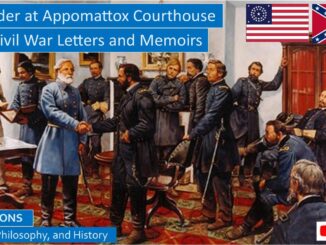
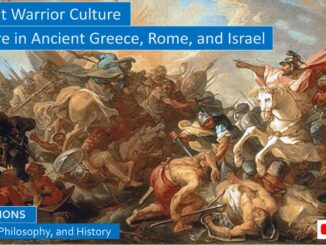
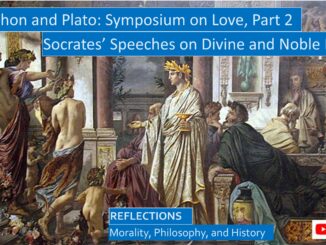
Be the first to comment